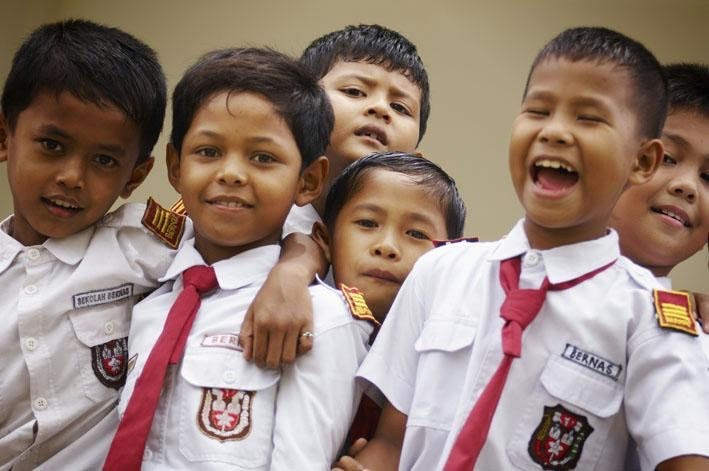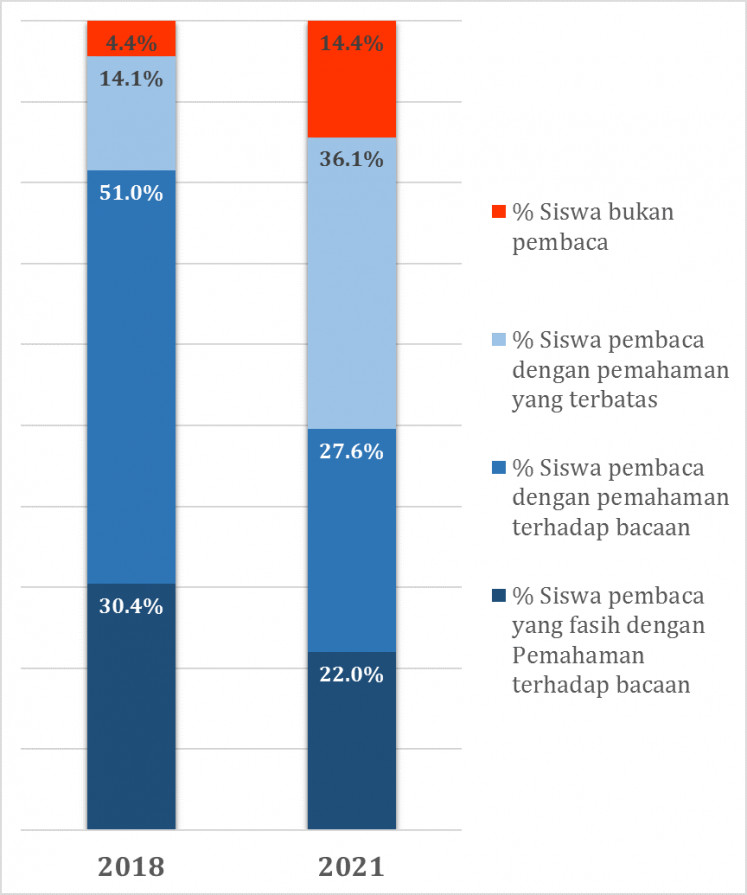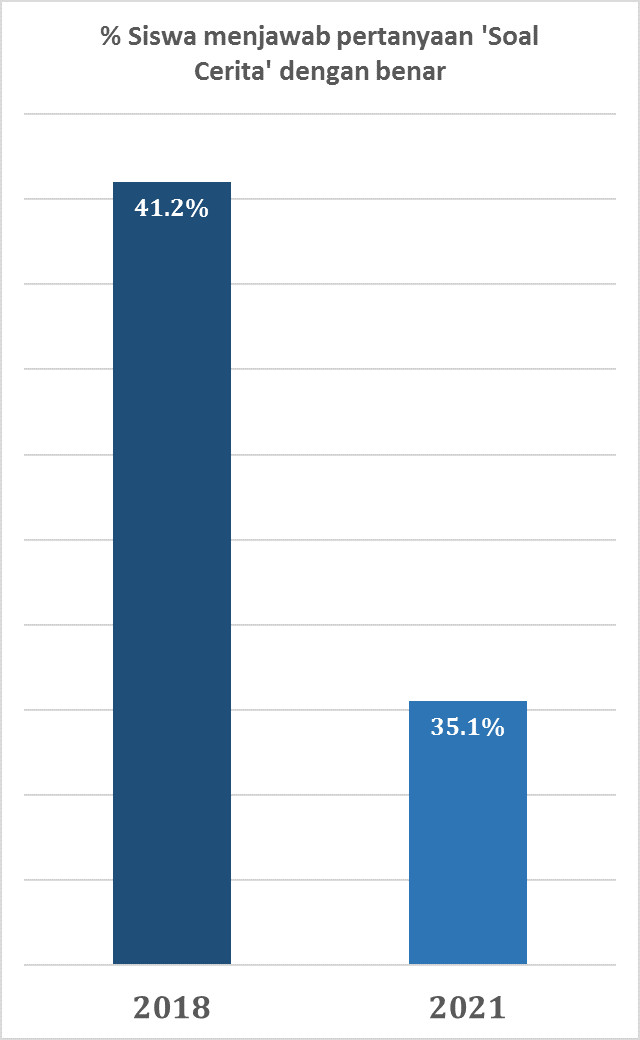Popular Reads
Top Results
Can't find what you're looking for?
View all search resultsPopular Reads
Top Results
Can't find what you're looking for?
View all search resultsTackling learning loss, improving literacy
Two years on, it has become clear that the COVID-19 pandemic has impacted numerous aspects of our lives, not least education.
Change text size
Gift Premium Articles
to Anyone
T
wo years on, it has become quite clear that the global COVID-19 pandemic has impacted numerous aspects of our lives, education notwithstanding.
Many parents and students will recall the sudden switch into online learning as social distancing and health protocols made it hard for schools to conduct face-to-face learning. Meanwhile, teachers were also required to quickly adapt to the technology used for the new learning approach.
At the same time, the discrepancy of infrastructure quality, especially on technology and information, in rural areas became a major obstacle during the online learning process.
Combined with the abruptness of the entire situation, it comes as no surprise when the quality of education itself becomes compromised.
Studies conducted in 2018 and 2021 by Myriad Consultants in 60 elementary schools that received the School Improvement Program by APRIL Group in Pelalawan, Siak, Kampar, Kuantan Singingi and Meranti Island Regencies in Riau Province found that the pandemic has caused a notable amount of learning loss in students, which can be defined as the loss of abilities and learning opportunities.
The studies used Early Grade Reading Assessment (EGRA) and Early Grade Math Assessment (EGMA) instruments to test numeration and literacy ability on second and third grade students, as well as assessing the schools’ learning environment.
Early Grade Math Assessment (EGMA)On EGRA, students are tested on their ability to recognize letters and words, along with answering basic questions according to a one-paragraph short story.
The EGRA results showed that the number of students with good ability on reading and comprehending the task declined as much as 8 percent from 2018 to 2021.
Early Grade Reading Assessment (EGRA)Just like literacy, the students’ numeration ability was also not as good as expected. This can be seen on the EGMA assessment, which tests the ability on recognizing numbers, doing addition and subtraction, and also answering story-related questions.
Of the 60 schools mentioned before, there has been a 6 percent drop on the number of students who answered correctly from 2018 to 2021.
The results of the 2018 baseline study and the 2021 results highlighted a learning loss or decrease in student learning outcomes due to the COVID-19 pandemic, where elementary school students started to shift to online learning as face-to-face meetings were discouraged.
On a wider scale, improving education quality is one of the Indonesian government’s targets, as it has become apparent that in the last ten years, the Programme for International Student Assessment (PISA) ratings among Indonesian students sit at the lowest 10 percent, ranking number 62 out of 70 countries. This highlighted the need to develop Reading, Mathematics, and Science abilities in Indonesian students.
As a response, the Education, Culture, Research and Technology Ministry recently launched the “Kurikulum Merdeka", which puts a stronger emphasis on the mastery of essential abilities such as literacy and numeration. These two abilities in particular serve as the foundation of science learning, underlining its importance.
According OECD numeration ability is the best method to tackle unemployment, loss of income, as well as improving quality of health. On the other hand, literacy provides a significant contribution towards social, economic, and overall public welfare.
One of the ways to jumpstart the learning quality is by enhancing the capacity of teachers, supervisors, and principals in organizing digital learning. This will require active involvement from different stakeholders, such as the government, private sector, academics, NGOs, and communities.
School Improvement Program (SIP) is one example of such attempt. This collaborative program potentially could increase the amount of well-literate students up to 4 percent per year.
The School Improvement Program itself was initiated in 2018 by PT Riau Andalan Pulp and Paper (RAPP), APRIL Group’s operating arm in Riau, in collaboration with Tanoto Foundation and five regency administrations in Riau, focusing on improving the quality of education in local elementary schools.
During its inception in 2018, the program covered 60 elementary schools, and by 2021, the number of participating schools increased to 172.
SIP trains school supervisors, principals, and teachers in School-Based Management, Teaching and Learning Processes, and other thematic training as needed. To date, 105 regional facilitators in five regencies consisting of teachers, school principals and supervisors have been involved in this program.
SIP supports the government in tackling literacy learning loss by conducting a number of activities, including study visits for the three schools with the lowest EGRA ratings in each regency to identify their challenges. Then, these teachers and principals from these schools are invited to observe and learn the best practices from schools with higher ratings for fostering a better reading culture.
Teachers and principals in partnering schools are also regularly invited to routine training sessions in finding these best practices, while the opportunity for discussion and sharing enables them to learn from each other.
Highlighting the importance of reading, the program also distributed more than 5,000 books for all 172 partnering schools. The books act as a stimulant for the schools and students, which is vital in fostering a systematic passion for reading.
The School Improvement Program is a part of APRIL2030 Commitment on Inclusive Progress which one of the goals is to promote quality education by achieving 10 percent above the national PISA ranking in schools supported by APRIL Group in Riau Province.
In the midst of this challenging global rivalry, it is clear that Indonesia needs to have quality human resources, and every capable citizen and stakeholder has their own role to play in increasing the quality of education and life any way possible.












